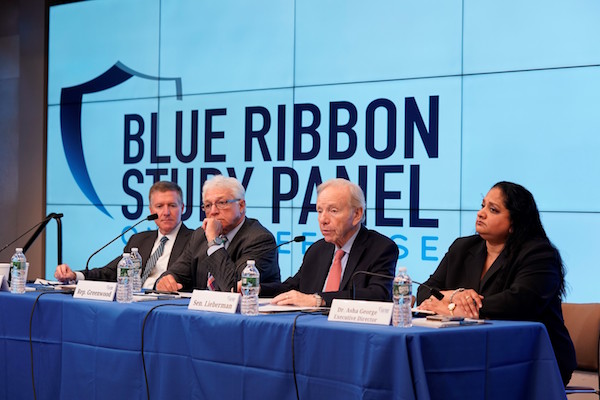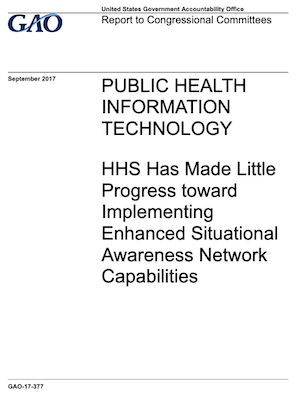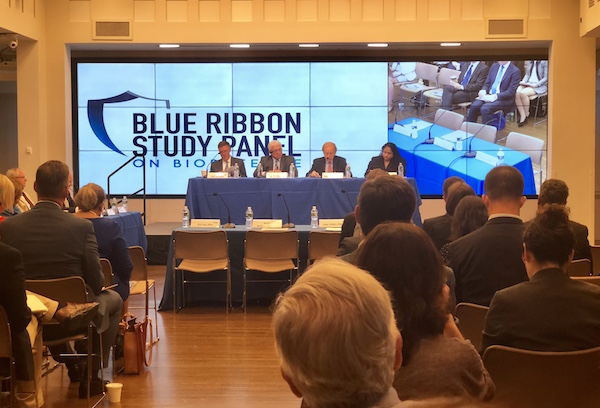biological threats
See the following -
Blue Ribbon Study Panel on Biodefense Calls for Action to Support SLTT Response to Biological Events
 America's hometown heroes are on the front line when responding to biological incidents. These include health care providers, public health professionals, EMTs, firefighters and police. But a new report from the Blue Ribbon Study Panel on Biodefense says the thousands of first responders at state, local, tribal, and territorial (SLTT) governments that form the backbone of our nation will have to fend for themselves for far too long until federal assets arrive to assist with response. Holding the Line on Biodefense: State, Local, Tribal, and Territorial Reinforcements Needed recommends eight key steps that will increase the capability of the SLTT public and private sectors to share with the federal government the burden of preparing for, responding to, and recovering from large-scale biological events.
America's hometown heroes are on the front line when responding to biological incidents. These include health care providers, public health professionals, EMTs, firefighters and police. But a new report from the Blue Ribbon Study Panel on Biodefense says the thousands of first responders at state, local, tribal, and territorial (SLTT) governments that form the backbone of our nation will have to fend for themselves for far too long until federal assets arrive to assist with response. Holding the Line on Biodefense: State, Local, Tribal, and Territorial Reinforcements Needed recommends eight key steps that will increase the capability of the SLTT public and private sectors to share with the federal government the burden of preparing for, responding to, and recovering from large-scale biological events.
- Login to post comments
Blue Ribbon Study Panel Recognizes National Security Strategy, Calls for Comprehensive Approach
 Senator Joseph Lieberman and Governor Tom Ridge, the co-chairs of the Blue Ribbon Study Panel on Biodefense, today addressed the newly updated U.S. National Security Strategy and the emphasis it places on combatting biological threats to the country. “With the release of the National Security Strategy, the Administration is sending a strong message to our enemies that America takes the biological threat seriously,” said Sen. Lieberman and Gov. Ridge.
Senator Joseph Lieberman and Governor Tom Ridge, the co-chairs of the Blue Ribbon Study Panel on Biodefense, today addressed the newly updated U.S. National Security Strategy and the emphasis it places on combatting biological threats to the country. “With the release of the National Security Strategy, the Administration is sending a strong message to our enemies that America takes the biological threat seriously,” said Sen. Lieberman and Gov. Ridge.
- Login to post comments
Congress Passes Legislation Authorizing Critical Biodefense Programs
 The House yesterday passed the Pandemic and All-Hazards Preparedness and Advancing Innovation Act. The bill reauthorizes existing statute governing public health efforts at the Department of Health and Human Services. Additions made by the bill - some of which were recommended by the Blue Ribbon Study Panel on Biodefense - address biodetection, hospital preparedness, medical countermeasures and response. Many of these programs will enable HHS to better defend the nation against biological threats. Both chambers of Congress have passed the bill, and it will now go to President Trump for signature.
The House yesterday passed the Pandemic and All-Hazards Preparedness and Advancing Innovation Act. The bill reauthorizes existing statute governing public health efforts at the Department of Health and Human Services. Additions made by the bill - some of which were recommended by the Blue Ribbon Study Panel on Biodefense - address biodetection, hospital preparedness, medical countermeasures and response. Many of these programs will enable HHS to better defend the nation against biological threats. Both chambers of Congress have passed the bill, and it will now go to President Trump for signature.
- Login to post comments
Experts support a future Manhattan Project for Biodefense to thwart new threats
 An effort similar to the Manhattan Project - in which American-led R&D produced the first nuclear weapons during World War II - is needed now in defense against the growing global threats posed by infectious diseases and bioterrorism, sources said Thursday during a Blue Ribbon Study Panel on Biodefense meeting...witness panelists and attendees at the panel's first public meeting held yesterday in New York City discussed "A Manhattan Project for Biodefense: Taking Biological Threats Off the Table," a proposed national, public-private research and development undertaking that would defend the United States against biological threats.
An effort similar to the Manhattan Project - in which American-led R&D produced the first nuclear weapons during World War II - is needed now in defense against the growing global threats posed by infectious diseases and bioterrorism, sources said Thursday during a Blue Ribbon Study Panel on Biodefense meeting...witness panelists and attendees at the panel's first public meeting held yesterday in New York City discussed "A Manhattan Project for Biodefense: Taking Biological Threats Off the Table," a proposed national, public-private research and development undertaking that would defend the United States against biological threats.
- Login to post comments
Is the US Finally Ready to Get Serious About Biodefense?
 Biological and other disaster threats - whether accidental, driven by forces of nature, or intentional - pose fairly grave risks to the United States and the world. Situational awareness has been a conspicuous topic ever since the 9/11 attacks and the anthrax scare that followed shortly thereafter. Since then we have experienced numerous disasters: health impacts of major weather events such as hurricanes and earthquakes, new virus outbreaks like Ebola in Africa, raging wildfires on the West Coast (I live in California), and the ever-present threat of pandemic flu which a hundred years ago infected some 500 million people across the globe and killed an estimated 50 million people worldwide, according to the Center for Disease Control and Preparedness (CDC). But since the initial flurry of public health preparedness funds in the ensuing several years after the 9/11 attacks, this topic has not had a high priority at CDC nor the funding necessary to implement it successfully.
Biological and other disaster threats - whether accidental, driven by forces of nature, or intentional - pose fairly grave risks to the United States and the world. Situational awareness has been a conspicuous topic ever since the 9/11 attacks and the anthrax scare that followed shortly thereafter. Since then we have experienced numerous disasters: health impacts of major weather events such as hurricanes and earthquakes, new virus outbreaks like Ebola in Africa, raging wildfires on the West Coast (I live in California), and the ever-present threat of pandemic flu which a hundred years ago infected some 500 million people across the globe and killed an estimated 50 million people worldwide, according to the Center for Disease Control and Preparedness (CDC). But since the initial flurry of public health preparedness funds in the ensuing several years after the 9/11 attacks, this topic has not had a high priority at CDC nor the funding necessary to implement it successfully.
- Login to post comments
National Biodefense Strategy: Protecting the Nation Against all Biological Threats
 Today, the White House and four federal departments unveiled a comprehensive National Biodefense Strategy to make America safer against modern biological threats to the United States. In the 21st century, biological threats are increasingly complex and dangerous, and that demands that we act with urgency and singular effort to save lives and protect Americans. Whether a natural outbreak, an accidental release, or a deliberate attack, biological threats are among the most serious we face, with the potential for significant health, economic and national security impacts. Therefore, promoting our health security is a national security imperative.
Today, the White House and four federal departments unveiled a comprehensive National Biodefense Strategy to make America safer against modern biological threats to the United States. In the 21st century, biological threats are increasingly complex and dangerous, and that demands that we act with urgency and singular effort to save lives and protect Americans. Whether a natural outbreak, an accidental release, or a deliberate attack, biological threats are among the most serious we face, with the potential for significant health, economic and national security impacts. Therefore, promoting our health security is a national security imperative.
- Login to post comments
Overdue Outbreak Detection System Leaves Patchwork Defense
 The U.S. should have had a nationwide network to monitor for the next viral outbreak or biological threat a decade ago. It still doesn't. Instead, public health leaders make do with a patchwork system while waiting for the Department of Health and Human Services races to get its integrated network in service by a new 2023 congressional deadline. Until that nationwide monitoring system is in place, the U.S. runs the risk that a biological threat like a disease outbreak will take hold before it's noticed. "The risk is that we don't have the level of surveillance that we need. The risk is that there are things basically flying under the radar," said Helen Boucher, an infectious diseases clinician at Tufts Medical Center in Boston and director of the university's Center for Integrated Management of Antimicrobial Resistance.
The U.S. should have had a nationwide network to monitor for the next viral outbreak or biological threat a decade ago. It still doesn't. Instead, public health leaders make do with a patchwork system while waiting for the Department of Health and Human Services races to get its integrated network in service by a new 2023 congressional deadline. Until that nationwide monitoring system is in place, the U.S. runs the risk that a biological threat like a disease outbreak will take hold before it's noticed. "The risk is that we don't have the level of surveillance that we need. The risk is that there are things basically flying under the radar," said Helen Boucher, an infectious diseases clinician at Tufts Medical Center in Boston and director of the university's Center for Integrated Management of Antimicrobial Resistance.
- Login to post comments
Pandemic and all-hazards preparedness, response law emboldens U.S. disaster recovery efforts
 The Pandemic and All-Hazards Preparedness and Advancing (PAHPA) Innovation Act, S. 1379, became law on Monday with the president's signature, prompting accolades from national stakeholders, company executives and federal lawmakers. The far-reaching law ensures the United States will be better prepared to respond to a wide range of public health emergencies, whether man-made or occurring through a natural disaster or infectious disease. Overall, the law aims to bolster the nation's health security strategy, strengthen the country's emergency response workforce, prioritize a threat-based approach, and increase communication across the advanced research and development of medical countermeasures (MCMs), among numerous provisions contained in the law.
The Pandemic and All-Hazards Preparedness and Advancing (PAHPA) Innovation Act, S. 1379, became law on Monday with the president's signature, prompting accolades from national stakeholders, company executives and federal lawmakers. The far-reaching law ensures the United States will be better prepared to respond to a wide range of public health emergencies, whether man-made or occurring through a natural disaster or infectious disease. Overall, the law aims to bolster the nation's health security strategy, strengthen the country's emergency response workforce, prioritize a threat-based approach, and increase communication across the advanced research and development of medical countermeasures (MCMs), among numerous provisions contained in the law.
- Login to post comments
Panel To Discuss 'A Manhattan Project For Biodefense' At NYC Public Meeting
 The bipartisan Blue Ribbon Study Panel on Biodefense will host its first-ever public meeting in New York City this Thursday, July 11, to discuss A Manhattan Project for Biodefense - a national, public-private research and development undertaking to defend the U.S. against biological threats. These threats include biological warfare and bioterrorism, where nation-states or terror groups intentionally spread biological agents to cause widespread panic and harm, as well as infectious disease pandemics.
The bipartisan Blue Ribbon Study Panel on Biodefense will host its first-ever public meeting in New York City this Thursday, July 11, to discuss A Manhattan Project for Biodefense - a national, public-private research and development undertaking to defend the U.S. against biological threats. These threats include biological warfare and bioterrorism, where nation-states or terror groups intentionally spread biological agents to cause widespread panic and harm, as well as infectious disease pandemics.
- Login to post comments
Ready or Not: New Report on Protecting the Public's Health
 The Trust for America's Health (TFAH) released its 2019 edition of what it hopes will be an annual report, Ready or Not: Protecting the Public's Health from Diseases, Disasters and Bioterrorism last February. The ground-breaking report warns about key global challenges ahead, like the risk of a flu pandemic; the impact of weather pattern changes due to climate change; the dangers of antimicrobial resistance, and others, and tries to offer advice on how to prepare for them.
The Trust for America's Health (TFAH) released its 2019 edition of what it hopes will be an annual report, Ready or Not: Protecting the Public's Health from Diseases, Disasters and Bioterrorism last February. The ground-breaking report warns about key global challenges ahead, like the risk of a flu pandemic; the impact of weather pattern changes due to climate change; the dangers of antimicrobial resistance, and others, and tries to offer advice on how to prepare for them.
- Login to post comments
Top White House Biodefense Official to Address Bipartisan Panel
 The Trump Administration recently released a National Biodefense Strategy to better defend the United States against myriad biological threats. The development and implementation of a comprehensive national biodefense strategy were among the top recommendations made by the bipartisan Blue Ribbon Study Panel on Biodefense in 2015. This Wednesday, November 14, the Panel will convene at the Hudson Institute in Washington, D.C. to gain a better understanding of how far the Executive Branch has come in implementing its National Blueprint for Biodefense.
The Trump Administration recently released a National Biodefense Strategy to better defend the United States against myriad biological threats. The development and implementation of a comprehensive national biodefense strategy were among the top recommendations made by the bipartisan Blue Ribbon Study Panel on Biodefense in 2015. This Wednesday, November 14, the Panel will convene at the Hudson Institute in Washington, D.C. to gain a better understanding of how far the Executive Branch has come in implementing its National Blueprint for Biodefense.
- Login to post comments
Using Open Technology To Build a Biodefense Against the Coronavirus
 As the number of US cases of the coronavirus rises, how will healthcare professionals be able to tell the difference between which panicked patients with similar symptoms has what? Even if the patient hasn't traveled to Wuhan or China recently, what if they sat at a Starbucks with someone who did? With the incubation time-lag before symptoms appear, who would even know? The challenge of monitoring 330 million people for infectious disease outbreaks is daunting. Take the flu as an example. During the last flu season which, as already discussed, was not as complex as this year's season, approximately 35.5 million Americans had flu symptoms, 16.5 million received medical care, 490,600 were hospitalized and 34,200 died.
As the number of US cases of the coronavirus rises, how will healthcare professionals be able to tell the difference between which panicked patients with similar symptoms has what? Even if the patient hasn't traveled to Wuhan or China recently, what if they sat at a Starbucks with someone who did? With the incubation time-lag before symptoms appear, who would even know? The challenge of monitoring 330 million people for infectious disease outbreaks is daunting. Take the flu as an example. During the last flu season which, as already discussed, was not as complex as this year's season, approximately 35.5 million Americans had flu symptoms, 16.5 million received medical care, 490,600 were hospitalized and 34,200 died.
- Login to post comments